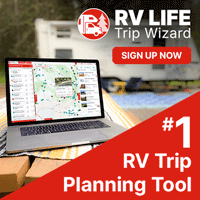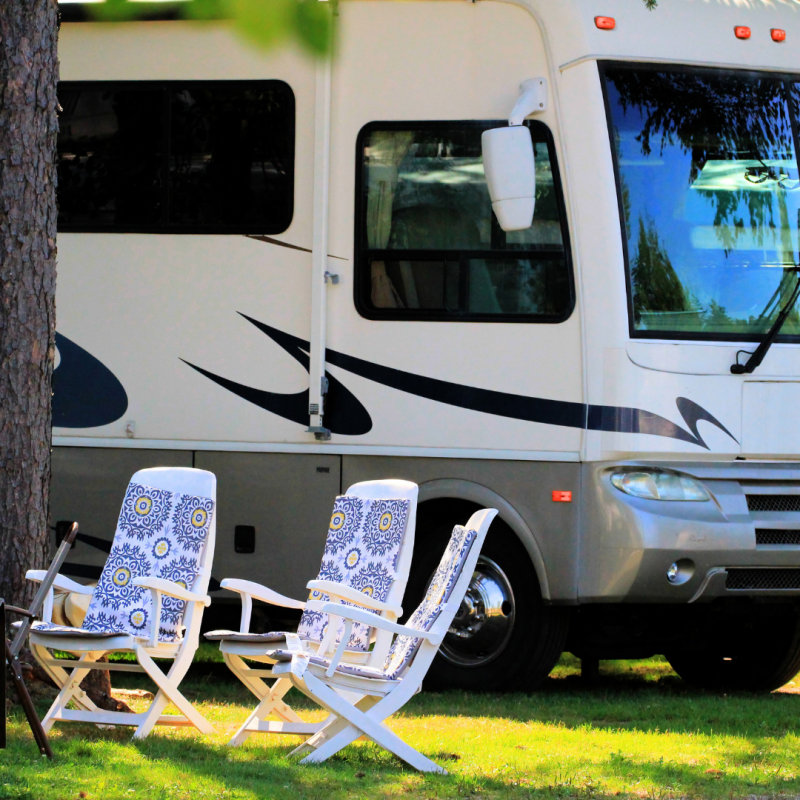
RV living is synonymous with freedom, adventure, and the open road, but one aspect that should never be overlooked is safety and security. Whether you're boondocking in remote areas, parked in a crowded RV park, or just taking a break at a rest stop, the importance of staying secure in your home on wheels cannot be understated. With the right precautions and equipment, you can enjoy your travels while keeping your RV, your belongings, and yourself safe from harm. In this blog post, we’ll explore the essential steps for ensuring safety and security in your RV, and highlight some useful products that can provide peace of mind on the road.
Disclaimer: Some of the links on this blog are affiliate links, meaning, at no additional cost to you, we may earn a commission if you click through and make a purchase. We only recommend products or services we believe will add value to our readers. Thank you for supporting our site.
1. Securing Your RV at the Campsite
The feeling of relaxation and comfort at a campsite is what many RVers strive for, but even in the most welcoming environments, it's vital to stay cautious. Campsites can attract all sorts of visitors, not all of whom are trustworthy. That’s why securing your RV while parked is the first line of defense against theft or unwanted intrusions.
The first step in securing your RV is ensuring all your windows and doors are properly locked when you're away. Upgrading your RV door locks from the standard factory options to more durable, pick-resistant locks is an easy way to boost security. Additionally, consider installing an RV door security latch, which adds another layer of protection and can prevent someone from tampering with your entryways.
Another key security measure is securing any outdoor equipment, such as bikes, grills, and outdoor furniture. Using heavy-duty chains and locks will deter thieves from grabbing valuable items left outside.
Did you know?
There is a standard key used across tons of RV's for access to your outside storage areas. And you can order it online! It's estimated that 60% of RV's use this key and lock system. That's a lot of chances that your gear is not protected.
2. RV Alarm Systems: A Must-Have
An RV alarm system is an essential part of your RV's security setup, especially if you frequently stay in places where you’re not surrounded by other campers or in unfamiliar areas. Many modern RV alarm systems are equipped with motion sensors, glass break detection, and even smart technology, allowing you to monitor your RV remotely from your smartphone.
These systems will not only alert you to potential break-ins but will also deter thieves from targeting your RV. Some systems even come with GPS tracking so you can recover your vehicle in case it’s stolen. When choosing an RV alarm system, prioritize one that offers multiple types of alerts (sound, mobile notifications, etc.) and is tailored for RV use rather than home or office security systems.
Recommended Products:
3. Surveillance Cameras for Extra Protection
Surveillance cameras are no longer bulky, difficult-to-install gadgets. Modern RV cameras are wireless, compact, and can often be monitored directly from your phone. These devices can provide real-time footage of your RV’s surroundings, alert you to motion, and even record events if you are away from your RV for extended periods.
Having a set of outdoor cameras strategically placed around your RV not only acts as a deterrent but also gives you peace of mind knowing that you can check on your surroundings at any time. When selecting cameras, go for those that offer night vision, weather resistance, and easy integration with smart devices.
4. Fire Safety in Your RV
Fire safety is often overlooked in RVs, yet the confined spaces and the use of propane for cooking and heating make RVs susceptible to fire hazards. Every RV should have multiple fire extinguishers readily available in key areas such as the kitchen, near the sleeping area, and in any storage compartments where flammable items are kept.
Beyond fire extinguishers, having functional smoke and carbon monoxide detectors is critical. These devices will alert you to dangers like an unnoticed fire or a propane leak, which can be deadly in an enclosed space like an RV. Regularly checking batteries and testing these detectors should be part of your RV maintenance routine.
Recommended Products:
5. Personal Safety on the Road
While campsite safety is important, personal safety on the road is equally crucial. Staying alert and practicing good road habits can go a long way in preventing accidents. Always plan your route in advance, use an RV-specific GPS system to avoid low-clearance bridges and restricted roads, and make sure to take breaks on long driving days to prevent fatigue.
Keeping emergency supplies in your RV, including a first aid kit, roadside flares, and a reliable flashlight, is also necessary in case you encounter any issues while driving. Additionally, having a reliable roadside assistance plan can offer peace of mind in case of a breakdown or other emergencies.
Recommended Products:

6. Protecting Against Wildlife While in the Wilderness
For many RVers, staying in the wilderness is one of the most thrilling aspects of the lifestyle. The serenity of nature, the beauty of remote locations, and the opportunity to observe wildlife in its natural habitat are unparalleled experiences. However, this closeness to nature also comes with certain risks—particularly when it comes to protecting yourself, your RV, and your belongings from wildlife encounters.
In wilderness areas, animals like bears, raccoons, coyotes, and even smaller critters can become curious about your campsite. While encounters with wildlife are rare, they can quickly turn dangerous if the proper precautions aren’t taken. Keeping animals at a safe distance not only protects you but also helps maintain a healthy boundary for the wildlife itself.
The first step in wildlife protection is proper food storage. Animals, particularly bears, have an excellent sense of smell and can be attracted to your RV or campsite if food is left out or improperly stored. Always store food in airtight containers and, whenever possible, keep it inside the RV. If you're boondocking in bear country, consider using bear-proof containers or locking your food in bear-resistant storage outside the RV.
Additionally, never leave pet food outside. It can attract animals just as easily as human food, leading to unwanted visitors. Secure garbage in wildlife-proof containers, and dispose of it properly to avoid luring animals close to your campsite.
Lighting is another effective deterrent. Motion-activated lights or perimeter lighting around your RV can help scare off animals that are naturally skittish when it comes to unfamiliar stimuli. Wildlife is more likely to avoid areas that are well-lit or suddenly illuminated by motion sensors.
Finally, take care with your pets. Always keep pets on a leash when outdoors, especially at night, to prevent them from wandering off and encountering wildlife. Dogs and cats can unintentionally provoke dangerous animals or fall victim to predators.
Recommended Products:
Final Thoughts: Prioritizing Safety and Security for a Better RV Experience
As you venture out on the road, embracing the beauty of the open landscape and the thrill of spontaneous adventures, it's easy to get lost in the romance of RV life. Yet, no matter how serene or remote your destination may be, the reality of safety and security should never be far from your mind. A proactive approach to protecting yourself, your RV, and your belongings can make all the difference between a smooth, worry-free journey and one fraught with preventable problems.
Safety and security in an RV are multifaceted, requiring attention both when you're on the road and when you're stationary at a campsite or in the wilderness. From securing your RV against potential break-ins to ensuring that your fire safety measures are up to date, every step counts. Installing an alarm system, using motion-sensor lighting, and upgrading your door locks may seem like small tasks, but they collectively create a robust defense against threats.
Equally important is maintaining personal safety while on the road. Knowing your routes, preparing for emergencies, and having the right roadside tools can prevent dangerous situations before they arise. And if you're one for boondocking in remote areas or camping in the wilderness, additional care should be taken to protect yourself from wildlife, ensuring a respectful boundary between your living space and the animals that inhabit the land.
Security measures don't have to be complicated or overly time-consuming, but implementing them can drastically enhance your peace of mind. Traveling in an RV is about embracing freedom and spontaneity, but freedom is truly enjoyed when it is safeguarded by preparation. With the right gear and a mindful approach to your surroundings, you can confidently explore the country’s natural wonders, urban landscapes, and everything in between without fear of unnecessary risks.
Remember, your RV is more than just a vehicle—it’s your home on wheels. As such, it deserves the same level of care and security that any traditional home would receive. By investing in quality safety products, establishing precautionary routines, and staying vigilant, you’ll be able to focus on what truly matters: the joy of discovery, the bond with nature, and the adventure that lies ahead. So, before you set out on your next great expedition, take the time to secure your RV, safeguard your personal well-being, and enjoy every mile of your journey with confidence and peace of mind. Safe travels!












Add comment
Comments